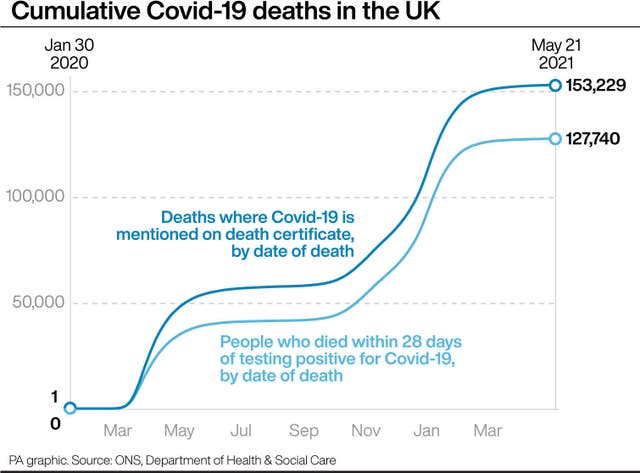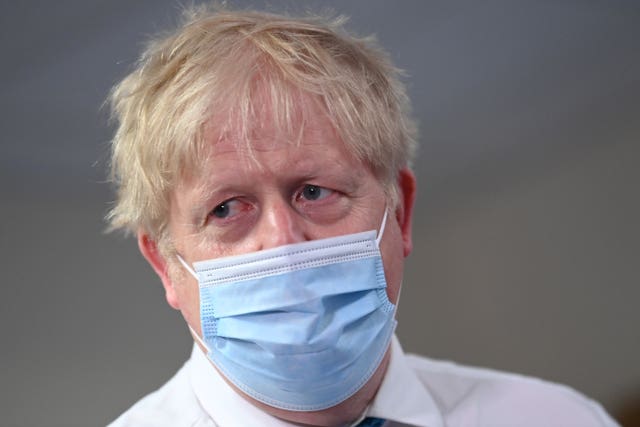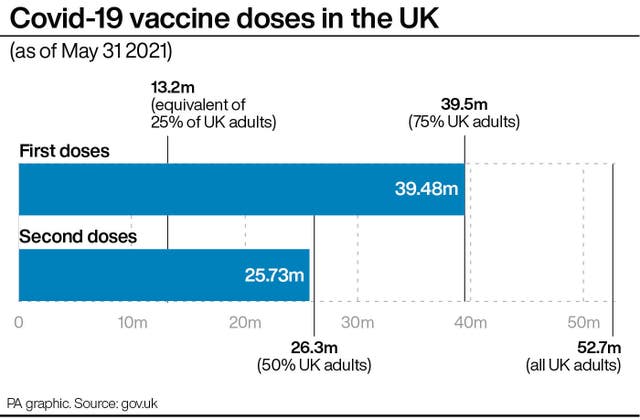
Experts are split over whether the final stage of lifting coronavirus restrictions should go ahead amid fears over a potential third wave of the pandemic washing over the UK.
Here, the PA news agency takes a look at some of the key issues and which measures may stay in place in England past the target date of June 21.
– What do the scientists say?
Some urge caution, while others say to go ahead with scrapping all Covid measures.
Professor Adam Finn, of the Joint Committee on Vaccination and Immunisation (JCVI), said there are still many people who are vulnerable to the effects of Covid-19, as he warned that pressing ahead with the easing of restrictions on June 21 “may be a bad decision”.
Professor Ravi Gupta, a member of the New and Emerging Respiratory Virus Threats Advisory Group (Nervtag), said a delay of a few weeks could have a positive impact on Britain’s battle against the highly-transmissible Indian variant, which is now being dubbed the Delta strain by the World Health Organisation, by allowing more people to be fully vaccinated.
It would be much better to over-react soon than under-react late to this – not only for public health but also for businesses including hospitality- shutting down completely again is the last thing everyone needs. Vaccination will take time to complete. https://t.co/77sOOYDVpI
— Adam Finn (@adamhfinn) May 31, 2021
But with the proportion of deaths involving coronavirus in England and Wales at its lowest level for more than eight months, others have said it remains a waiting game.
Sir John Bell, regius professor of medicine at Oxford University, told BBC Radio 4’s Today programme on Wednesday that current figures “don’t look too intimidating” but they still need to “play out for a couple of weeks” before the Government makes its final decision on whether the June 21 reopening can go ahead.
The Government’s former chief scientific adviser, Sir Mark Walport, has also argued that ministers need more data before they can make a final decision.
Robert Dingwall, professor of sociology at Nottingham Trent University, has gone further, arguing it is “really important that we go ahead on June 21” from a “societal point of view”.
– So what does the data say?
The latest data shows that there were 9,860 deaths from all causes registered in the week ending May 21, according to the Office for National Statistics (ONS), with 1.1% of those – 107 – mentioning “novel coronavirus” on the death certificate.

The last time that the proportion was so low was in the week ending September 11, when the virus accounted for 1% of deaths, according to PA news agency analysis.
It comes as Government figures, based on people who died within 28 days of testing positive for Covid-19, show that zero deaths from the virus were reported in the UK on Tuesday, while there have been 870 coronavirus-related hospital admissions across the UK between May 26 and June 1.
– So are we in the clear then?
Not quite. When it comes to cases, there is evidence that Covid-19 rates are starting to rise steeply in areas of north west England, such as Manchester and the Ribble Valley in Lancashire.
Blackburn with Darwen remains the area with the highest rate in the country: 416.2, up from 281.2, although the rate in fellow hotspot Bolton has fallen week-on-week from 452.1 to 386.
– Where does that leave us?
Some clinicians have said that although cases are rising, and in some areas hospitalisations too, these now look very different to the admissions which were seen in January and February.
The majority of people who are being admitted to hospitals are younger and easier to treat, while almost 75% of adults have now had at least one jab.
– What does the Government think?
Downing Street has indicated that Boris Johnson still sees nothing in the data to suggest the plan to end all legal lockdown restrictions on June 21 will need to be delayed.
Asked about the Prime Minister’s plans amid warnings over the spread of the Delta variant, a No 10 spokesman said: “The Prime Minister has said on a number of occasions that we haven’t seen anything in the data but we will continue to look at the data, we will continue to look at the latest scientific evidence as we move through June towards June 21.”

Following the recording of zero Covid deaths on Tuesday, Health Secretary Matt Hancock said “vaccines are clearly working” – a sentiment echoed by the Education Secretary during the morning broadcast round the following day.
Gavin Williamson told LBC radio there was a sense in Government that there had been “really promising progress” towards scrapping all restrictions this month.
He said: “You’re right to say it is about data, not dates, but the vaccines are having an impact in terms of actually reducing transmission, reducing the number of people in hospital and it is these factors that are going to guide the decision.”
– Has the vaccine rollout helped?
Undoubtedly. More than 65 million total vaccines have now been delivered across the UK and it is expected that three quarters of adults in the UK will receive their first dose by Wednesday.
The majority of those ending up in hospital with coronavirus now are also unvaccinated.
But Prof Gupta has previously warned “there may be a false sense of security for some time” over vaccines.

– What restrictions could stay?
One way to allow the unlocking to go ahead on June 21 could be to keep some of the less restrictive measures in place.
There have been suggestions that face coverings could still be required on public transport and indoors.
Or people might be told that working from home advice should remain in place.
– And which are ministers keen to get rid of?
The big-ticket item is the scrapping of the one-metre plus rule, seen to be harming hospitality businesses.
It has been reported that the Government has already ditched the idea of Covid passports, which would ask punters to prove their vaccination or Covid-negative status to access mass gatherings such as gigs and sporting events.
The Treasury is also reportedly prioritising the removal of the rule of six indoors in order to help the economy recover.
– When will we find out more?
A review of what measures will be relaxed on June 21 was due by the end of May but has been pushed back due to the Indian variant.
Downing Street has said plans for unlocking will be outlined on June 14.


Comments: Our rules
We want our comments to be a lively and valuable part of our community - a place where readers can debate and engage with the most important local issues. The ability to comment on our stories is a privilege, not a right, however, and that privilege may be withdrawn if it is abused or misused.
Please report any comments that break our rules.
Read the rules hereLast Updated:
Report this comment Cancel